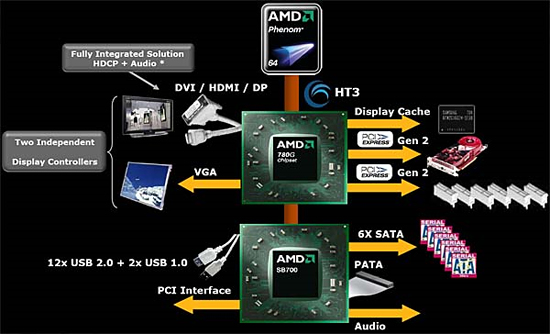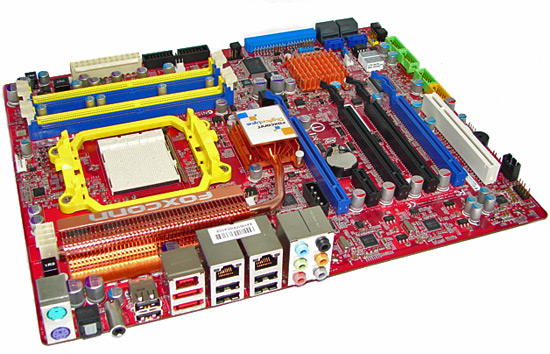AMD's SB750: Enabling Higher Phenom Overclocks?
by Gary Key on July 23, 2008 12:00 AM EST- Posted in
- CPUs
The web has been alive with rumors of an upcoming update to AMD's 7-series chipsets that will somehow unlock the true overclocking potential of its Phenom processors. The rumor goes something like this: an updated South Bridge (SB750) will improve communication with Phenom, removing a previous bottleneck and improving the maximum overclock possible. We can't begin to explain the many issues with the various rumors, but we have to allow that somewhere buried deep in these rumors there is a morsel of truth.

The AMD 780G chipset, the South Bridge is the chip, er, at the south end of the image. USB, SATA and Audio all stem off of this chip.
The South Bridge of a chipset is typically responsible for I/O operations. The non-critical PCIe lanes come off of this chip, as do the SATA and USB ports. Audio codecs, networking interfaces and virtually all other components are also run off the South Bridge. The North Bridge on the other hand talks directly to the CPU and connects it to much higher speed elements of the system; things like graphics cards and main memory all stem from the typical North Bridge design. The point of this explanation being that if anything were going to improve overclocking performance, we would assume it would be the North Bridge, not the SB. However, AMD has taken a different approach from traditional chipset engineering as we will soon see.
We've been waiting for a motherboard with AMD's SB750 South Bridge ever since we started hearing these rumors, and we finally received one:

Foxconn sent us their new A79A-S motherboard that is part of their Digital Life series of products. This motherboard was not designed to be an extreme overclocker, but instead a feature rich platform that offers the capability to overclock when required. In testing to date, the board has actually gained a reputation of being an excellent overclocker along with a full featured BIOS. While the BIOS options are not as extensive as the top end 790FX products from ASUS or DFI, there are more than enough options to ensure successful overclocking for the vast majority of users. Foxconn is still developing the BIOS and we have sent our feedback on a few areas we would like to see improved, but overall, this board gets a recommendation from us.
We will take an additional look at the board during the official 790FX/SB750 launch activities next week but here are a few major features. The A79A-S includes four x16 PCIe 2.0 slots (dual x16 or quad x8 electrical), one PCIe x1 and one PCI slots, six native SATA II ports featuring RAID 0, 1, 5, or 10 support, two dual e-SATA ports, dual Gigabit LAN ports, Realtek ALC888 HD audio featuring DTS Connect and Dolby Digital Live support, 12 USB 2.0 connections, dual IEEE-1394a connections, LED Debug display, and on/Off/CMOS buttons.
Let's take a look at how all of this works, at least what we know works.










48 Comments
View All Comments
wingless - Wednesday, July 23, 2008 - link
"In the end, we know after a good 60 hours of testing, over 600 different settings, 400+ screen shots, and countless reboots that Advanced Clock Calibration works, yet we do not know anymore about ACC at this point from AMD than SpongeBob SquarePants."AMD does nothing but right their wrongs these days. The SB750 is gonna be big for them. I'm amazed that Anandtech went through so many combinations trying to bring this thing down. They have proven without a doubt that this technology works.
I also can't wait until next week. They have given us confirmation that 790GX and 790FX boards with SB750 will be coming out NEXT WEEK! Also they keep mentioning some part that they "dare not mention". WTF is that going to be? I thought 790GX+SB750 was going to be the big news. Theres something else? Next week will be exciting for AMD in all the GOOD ways.
ZootyGray - Thursday, July 24, 2008 - link
Yup - I come here to hear about the results of what I call "brutal testing" rather than read somebody's hype or bias or sloppy inconclusive testing. I am still fairly new here but I believe Anandtech is the real thing.I want that to be true, esp. after wasting my time at tom's bubblegum guide with there trash bias garbage misleading bullschtein socalled reviews.
These guys are working hard to get the real goods - and in contact with AMD, delaying reports promised 'tomorrow' - who cares - they are willing to go to amazing lengths to output accurate info after deeper investigation.
This is no kiddy's website - it's a hard read to get through it; and I know I am not the only one who will reread it to better comprehend what I missed the first time through. This testing is consistent with the articles on 'the 3 amigos' and the one about the recent additions to the AMD line, including the 9950. Take it apart, what makes it squeal.
Also, it seems there is something different about the 9950, and it's not just an oclok 9850.
Looking forward to more next week - and the ?? mystery ?? item????
Big change on the AMD scene - wow.
Calin - Thursday, July 24, 2008 - link
I've quit reading Tom's Hardware long time ago - when I think it was a good site. However, Anandtech was better overall, and one site was enough :)As for in depth reviews... this should qualify as an easy reading, look for the technology behind NVidia's 280 and 260 series GPU for a "transistor-oriented" article - that's a hard read indeed
Comdrpopnfresh - Wednesday, July 23, 2008 - link
I am really interested to see how an ASUS or DFI board with the new sb do in overclocking and performance. As mentioned this board is more of a feature-rich pick. And just looking at the charts of ACC off on the foxconn vs the ASUS with sb600, I hope there will be more of an improvement with a fresh sb750 variant.Interesting though about the pci-e 1.1 and lan choices by amd. Is it possible having those two remedied would hinder the improvement by ACC?
Really looking forward to new comparisons to Intel chips with the new change. Hopefully with 45nm parts and ACC, amd can have a good go.
One thing I would like to know though: What are the specs on the sb750 foxconn vs the asus sb600 in terms of the number of phases in power delivery?
Goty - Wednesday, July 23, 2008 - link
I think that there must be some underlying issue with either the chipset drivers or windows itself when it comes to differing final overclocks, as the CPU shouldn't necessarily be aware of what kind of software its running, other than the fact that a few more registers are being used. IS there any evidence that this is a Phenom-specific issue, or might it affect Athlon64's as well?Locutus465 - Thursday, July 24, 2008 - link
Quite honestly, either way I would run 64bit over 32bit any day of the week period... I'm sorry but the little bit of extra performance you get OCing really doesn't out weigh the many many advantages 64b vista has over the 32b variant (and over XP). Simply put, 32bit operating systems are all but done in my home... I do run 32bit vista on my laptop but only for the following reasons:HP put 32bit on here, and it seems to me all their custom drivers and software (which seem to be required to keep the system from crashing) are all 32bit... so oh well.
This is a budget laptop to begin with and it maxes out at 2GB RAM... The extra overhead of 64b would just be more of a performance killer than anything else.
No gaming will be done on this laptop (so no need to worry about future games needing more that 2GB for a process) and I have my desktop at home if I need to manipulate large flat files.
Now my desktop? Yeah...
Phenom 9850BE
4GB OCz DDR2
Radeon 3870...
It's getting the 64bit treatment all the way :)
CyberHawk - Wednesday, July 23, 2008 - link
... boy, I was waiting for this one :DFireTech - Wednesday, July 23, 2008 - link
So was I ;)It leaves me with more questions than answers though. Time to re-read and await further developements/articles.